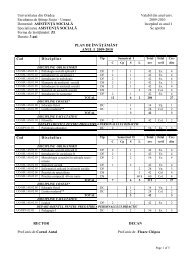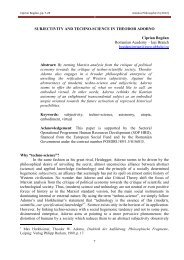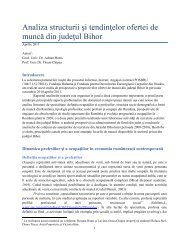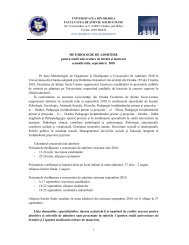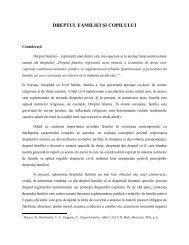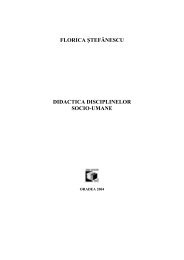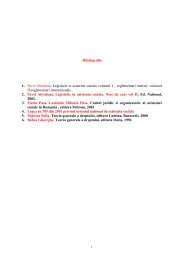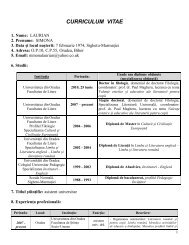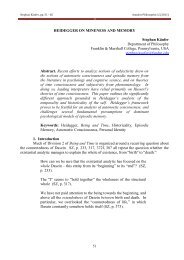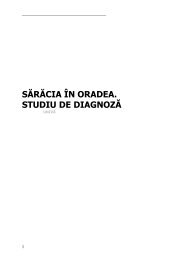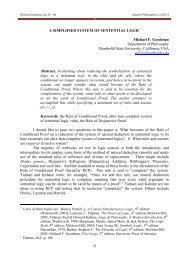the romantic theory of understanding and ... - socioumane.ro
the romantic theory of understanding and ... - socioumane.ro
the romantic theory of understanding and ... - socioumane.ro
Create successful ePaper yourself
Turn your PDF publications into a flip-book with our unique Google optimized e-Paper software.
Annales Philosophici 6 (2013) Navid Afsharzadeh, pp. 11-18<br />
revealed <st<strong>ro</strong>ng>the</st<strong>ro</strong>ng> unstable nature <st<strong>ro</strong>ng>of</st<strong>ro</strong>ng> language <st<strong>ro</strong>ng>and</st<strong>ro</strong>ng> linked this fact directly to <st<strong>ro</strong>ng>the</st<strong>ro</strong>ng> finitude <st<strong>ro</strong>ng>of</st<strong>ro</strong>ng> human<br />
consciousness. The Jena <st<strong>ro</strong>ng><strong>ro</strong>mantic</st<strong>ro</strong>ng>s <st<strong>ro</strong>ng>and</st<strong>ro</strong>ng> especially Friedrich Schlegel, by emphasizing <st<strong>ro</strong>ng>the</st<strong>ro</strong>ng><br />
limits <st<strong>ro</strong>ng>of</st<strong>ro</strong>ng> <st<strong>ro</strong>ng>underst<st<strong>ro</strong>ng>and</st<strong>ro</strong>ng>ing</st<strong>ro</strong>ng> took an account <st<strong>ro</strong>ng>of</st<strong>ro</strong>ng> incomprehensibility <st<strong>ro</strong>ng>and</st<strong>ro</strong>ng> investigated about <st<strong>ro</strong>ng>the</st<strong>ro</strong>ng><br />
element <st<strong>ro</strong>ng>of</st<strong>ro</strong>ng> non-<st<strong>ro</strong>ng>underst<st<strong>ro</strong>ng>and</st<strong>ro</strong>ng>ing</st<strong>ro</strong>ng> which occurs in every act <st<strong>ro</strong>ng>of</st<strong>ro</strong>ng> <st<strong>ro</strong>ng>underst<st<strong>ro</strong>ng>and</st<strong>ro</strong>ng>ing</st<strong>ro</strong>ng>.<br />
Such convictions along with <st<strong>ro</strong>ng>the</st<strong>ro</strong>ng>ir anti-foundationalism led <st<strong>ro</strong>ng>the</st<strong>ro</strong>ng>m to indorse <st<strong>ro</strong>ng>the</st<strong>ro</strong>ng><br />
fragmentary characteristic <st<strong>ro</strong>ng>of</st<strong>ro</strong>ng> human consciousness <st<strong>ro</strong>ng>and</st<strong>ro</strong>ng> secure <st<strong>ro</strong>ng>the</st<strong>ro</strong>ng>ir turn toward a new style <st<strong>ro</strong>ng>of</st<strong>ro</strong>ng><br />
philosophical writing. Thus, <st<strong>ro</strong>ng>the</st<strong>ro</strong>ng> <st<strong>ro</strong>ng><strong>ro</strong>mantic</st<strong>ro</strong>ng> fragment was born as an i<strong>ro</strong>nic genre that contains a<br />
combination <st<strong>ro</strong>ng>of</st<strong>ro</strong>ng> poetry <st<strong>ro</strong>ng>and</st<strong>ro</strong>ng> philosophy. The aes<st<strong>ro</strong>ng>the</st<strong>ro</strong>ng>tics <st<strong>ro</strong>ng>of</st<strong>ro</strong>ng> fragmentary writing indicates an<br />
internal alteration which hovers between self-creation <st<strong>ro</strong>ng>and</st<strong>ro</strong>ng> self-destruction. Therefore <st<strong>ro</strong>ng>the</st<strong>ro</strong>ng><br />
<st<strong>ro</strong>ng><strong>ro</strong>mantic</st<strong>ro</strong>ng> work challenges <st<strong>ro</strong>ng>the</st<strong>ro</strong>ng> idea <st<strong>ro</strong>ng>of</st<strong>ro</strong>ng> totality <st<strong>ro</strong>ng>and</st<strong>ro</strong>ng> embraces its own imperfection. Although<br />
this attitude will lead to <st<strong>ro</strong>ng>the</st<strong>ro</strong>ng> work's unworking, by ignoring <st<strong>ro</strong>ng>the</st<strong>ro</strong>ng> "final word", it leaves <st<strong>ro</strong>ng>the</st<strong>ro</strong>ng> work<br />
open to future. This is <st<strong>ro</strong>ng>the</st<strong>ro</strong>ng> work <st<strong>ro</strong>ng>of</st<strong>ro</strong>ng> <st<strong>ro</strong>ng><strong>ro</strong>mantic</st<strong>ro</strong>ng> work.<br />
References<br />
Behler, Ernest (1993). German Romantic Literary Theory, Cambridge: Cambridge University<br />
Press<br />
Beiser, Fredrick C. (2002). German Idealism: Struggle against Subjectivism, Massachusetts:<br />
Harvard University Press<br />
Beiser, Fredrick C. (2003). The Romantic Imperative: The Concept <st<strong>ro</strong>ng>of</st<strong>ro</strong>ng> Early German<br />
Romanticism, Massachusetts: Harvard University Press<br />
Bernstein. J. M. (2003). Classic <st<strong>ro</strong>ng>and</st<strong>ro</strong>ng> Romantic German Aes<st<strong>ro</strong>ng>the</st<strong>ro</strong>ng>tics, Cambridge: Cambridge<br />
University Press<br />
Bowie, Andrew (2002). F<strong>ro</strong>m <st<strong>ro</strong>ng><strong>ro</strong>mantic</st<strong>ro</strong>ng>ism to critical <st<strong>ro</strong>ng>the</st<strong>ro</strong>ng>ory: <st<strong>ro</strong>ng>the</st<strong>ro</strong>ng> philosophy <st<strong>ro</strong>ng>of</st<strong>ro</strong>ng> German<br />
literary <st<strong>ro</strong>ng>the</st<strong>ro</strong>ng>ory, London: Taylor & Francis e-Library<br />
Bowie, Andrew (1993). Aes<st<strong>ro</strong>ng>the</st<strong>ro</strong>ng>tics <st<strong>ro</strong>ng>and</st<strong>ro</strong>ng> Subjectivity: F<strong>ro</strong>m Kant to Nietzsche, Manchester:<br />
Routledge<br />
Corby, James (2010). The Eu<strong>ro</strong>pean Legacy, Vol. 15, No. 6, pp. 751–768. Emphasising <st<strong>ro</strong>ng>the</st<strong>ro</strong>ng><br />
Positive: The Critical Role <st<strong>ro</strong>ng>of</st<strong>ro</strong>ng> Schlegel’s Aes<st<strong>ro</strong>ng>the</st<strong>ro</strong>ng>tics, Routledge<br />
Critchley, Simon (2004). Very Little – Almost Nothing: Death, Philosophy, Literature,<br />
London: Routledge<br />
Frank, Manfred (2004). The Philosophical Foundations <st<strong>ro</strong>ng>of</st<strong>ro</strong>ng> Early German Romanticism, trans.<br />
Elizabeth Millan-Zaibert, Albany: State University <st<strong>ro</strong>ng>of</st<strong>ro</strong>ng> New York Press<br />
Hammermeister, Kai (2002). The German Aes<st<strong>ro</strong>ng>the</st<strong>ro</strong>ng>tic Tradition, Cambridge: Cambridge<br />
University Press<br />
Lacoue-Labar<st<strong>ro</strong>ng>the</st<strong>ro</strong>ng>, Phillipe, <st<strong>ro</strong>ng>and</st<strong>ro</strong>ng> Jean-Luc Nancy (1988). The Literary Absolute: The Theory <st<strong>ro</strong>ng>of</st<strong>ro</strong>ng><br />
Literature in German Romanticism, trans. Philip Bernard, Albany: state university <st<strong>ro</strong>ng>of</st<strong>ro</strong>ng><br />
New Yorke press<br />
Lyne, Ian (1995). Walter Benjamin <st<strong>ro</strong>ng>and</st<strong>ro</strong>ng> Romanticism: The Romantic Tradition, Coventry:<br />
P<strong>ro</strong>quest<br />
Millan-Zaibert, Elizabeth (2007). Friedrich Schlegel <st<strong>ro</strong>ng>and</st<strong>ro</strong>ng> <st<strong>ro</strong>ng>the</st<strong>ro</strong>ng> Emergence <st<strong>ro</strong>ng>of</st<strong>ro</strong>ng> Romantic<br />
Philosophy, Albany: State University <st<strong>ro</strong>ng>of</st<strong>ro</strong>ng> New York Press<br />
Schlegel, Friedrich Von. (1991). Philosophical Fragments, trans. Peter Firchow, Minneapolis:<br />
University <st<strong>ro</strong>ng>of</st<strong>ro</strong>ng> Minnesota Press<br />
Schlegel, Friedrich Von. (1971). Friedrich Schlegel’s Lucinde <st<strong>ro</strong>ng>and</st<strong>ro</strong>ng> <st<strong>ro</strong>ng>the</st<strong>ro</strong>ng> Fragments, trans. Peter<br />
Firchow, Minneapolis: University <st<strong>ro</strong>ng>of</st<strong>ro</strong>ng> Minnesota Press<br />
Strathman, Christopher A. (2006). Romantic Poetry <st<strong>ro</strong>ng>and</st<strong>ro</strong>ng> <st<strong>ro</strong>ng>the</st<strong>ro</strong>ng> Fragmentary Imperative:<br />
Schlegel, By<strong>ro</strong>n, Joyce, Blanchot, Albany: State University <st<strong>ro</strong>ng>of</st<strong>ro</strong>ng> New York Press<br />
18



